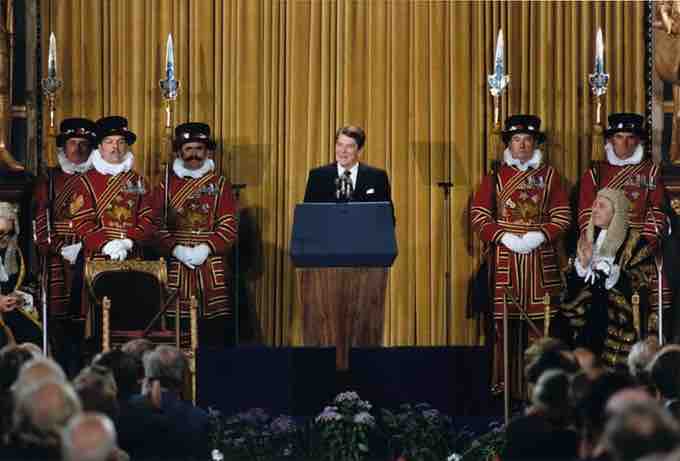Overview: Reagan's Foreign Policy
The foreign policy of the Ronald Reagan administration from 1981 to 1989 was characterized by a strategy of "peace through strength." Critics label Reagan's policies as aggressive, imperialistic, and "warmongering"; however, these policies were supported by leading American conservatives who argued they were necessary to protect U.S. security interests. While Ronald Reagan worked to restrict the influence of the federal government in people’s lives, he simultaneously pursued interventionist policies abroad as part of a global Cold War strategy. Eager to cure the United States of “Vietnam Syndrome,” he increased the American stockpile of weapons and aided anti-Communist groups in the Caribbean and Central America. As part of the policies that became known as the Reagan Doctrine, the United States also offered financial and logistics support to the anti-communist opposition in central Europe and took an increasingly hard line against socialist and communist governments in Afghanistan, Angola, and Nicaragua.
The Escalating Cold War
Reagan escalated the Cold War during his presidency, accelerating a reversal from the policy of détente which began in 1979 following the Soviet war in Afghanistan. Reagan ordered a massive buildup of the United States Armed Forces and implemented new policies toward the Soviet Union. He revived the B-1 Lancer program that had been canceled by the Carter administration and began producing the MX missile. In response to Soviet deployment of the SS-20, Reagan oversaw the North Atlantic Treaty Organization's (NATO's) deployment of the Pershing missile in West Germany.
Together with the United Kingdom's prime minister Margaret Thatcher, Reagan denounced the Soviet Union in ideological terms. In a famous address given on June 8, 1982 to the British Parliament in the Royal Gallery of the Palace of Westminster, Reagan said: "the forward march of freedom and democracy will leave Marxism-Leninism on the ash-heap of history." On March 3, 1983, he predicted that communism would collapse, stating: "Communism is another sad, bizarre chapter in human history whose last pages even now are being written." In a speech to the National Association of Evangelicals on March 8, 1983, Reagan called the Soviet Union "an evil empire."
On September 1, 1983, Soviet fighters struck down Korean Air Lines Flight 007, carrying 269 people including Georgia congressman Larry McDonald, near Moneron Island. Reagan labeled the act a "massacre" and responded to the incident by suspending all Soviet passenger air service to the United States; he also dropped several agreements being negotiated with the Soviets, wounding them financially. As a result of the shootdown—the cause of KAL 007's going astray thought to be inadequacies related to its navigational system—Reagan announced on September 16, 1983 that the Global Positioning System would be made available for civilian use, free of charge, to avert similar navigational errors in future.
The Reagan Doctrine
Dedicated to upholding even authoritarian governments in foreign countries to keep them "safe" from Soviet influence, Reagan was also desperate to put to rest Vietnam Syndrome, the reluctance to use military force in foreign countries for fear of embarrassing defeat, which had influenced U.S. foreign policy since the mid-1970s. Under a policy that came to be known as the Reagan Doctrine, Reagan and his administration provided overt and covert aid to anti-communist resistance movements in an effort to manipulate governments in Africa, Asia, and Latin America away from communism and toward capitalism. Reagan deployed the CIA's Special Activities Division to Afghanistan and Pakistan, who were instrumental in training, equipping and leading Mujaheddin forces against the Soviet Army. President Reagan's Covert Action program has been given credit for assisting in ending the Soviet occupation of Afghanistan, though the US funded armaments introduced then would later pose a threat to US troops in the 2000s war in Afghanistan. However, in a break from the Carter policy of arming Taiwan under the Taiwan Relations Act, Reagan agreed with the communist government in China to reduce the sale of arms to Taiwan.
The Strategic Defense Initiative
In March of 1983, Reagan introduced the Strategic Defense Initiative (SDI), a defense project that would use ground- and space-based systems to protect the United States from attack by strategic nuclear ballistic missiles. Reagan believed that this defense shield would make nuclear war impossible, but disbelief that the technology could ever work led opponents to dub SDI "Star Wars," arguing that the technological objective was unattainable. The Soviets became concerned about the possible effects SDI would have; leader Yuri Andropov said it would put "the entire world in jeopardy."

President Reagan Addressing British Parliament, London, June 8, 1982
Reagan, the first American president ever to address the British Parliament, predicted Marxism-Leninism would be left on the "ash-heap of history."